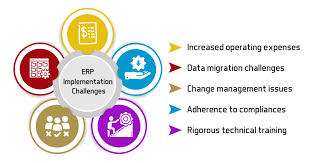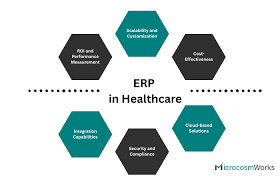Embarking on a career change into ERP software implementation can be one of the most rewarding decisions for professionals looking to grow in the tech space. Enterprise Resource Planning (ERP) systems are at the heart of modern business operations. With industries increasingly leaning towards seamless digital solutions, ERP expertise is in demand. Whether you are an IT professional, a business analyst, or someone looking to transition from another field, understanding the potential of ERP careers can open doors to unparalleled opportunities.
What is ERP Software Implementation?
ERP software implementation refers to the process of deploying and integrating ERP systems within a business’s operations. These systems streamline tasks by automating and centralizing processes like accounting, human resources, inventory management, and customer relations.
This career path requires technical knowledge, problem-solving skills, and a deep understanding of business workflows. As Tamer Badr, the owner of Singleclic, notes: “ERP implementation isn’t just about technology. It’s about understanding businesses, solving their problems, and enabling them to achieve goals faster.”
Why Choose ERP as a Career?
Switching careers can be daunting but ERP software implementation offers unique advantages:
- High Demand: Every business, from small startups to large enterprises, needs ERP systems to scale.
- Lucrative Salaries: ERP consultants are among the best-paid IT professionals.
- Dynamic Work Environment: No two projects are the same, making this career intellectually engaging.
- Global Opportunities: ERP systems are universal, giving you access to work with multinational companies.
- Skill Transferability: ERP professionals can branch into project management, business analysis, or specialized ERP tools like SAP or Oracle.
How to Transition into ERP Software Implementation?
Evaluate Your Skills
Before diving in, assess your current abilities. If you have a background in IT, business analysis, or project management, you already possess transferable skills. For those from non-technical fields, don’t worry—learning ERP frameworks like SAP or Microsoft Dynamics can be done through training and certification programs.
Gain ERP-Specific Knowledge
- Enroll in Training: Courses like SAP ERP, Oracle NetSuite, or Microsoft Dynamics are valuable.
- Certifications: Consider certifications like SAP Certified Application Associate or Oracle ERP Cloud certifications.
- Internships and Volunteering: Work on real-world ERP projects to gain hands-on experience.
Build a Network
Join LinkedIn groups or ERP communities to learn from experts and stay updated on industry trends. Networking can also lead to mentorship opportunities and job referrals.
People Are Always Asking: Is an ERP Career Worth It?
This is a common question and the answer largely depends on your career goals. If you’re passionate about business processes and technology ERP offers a highly rewarding pathway. Here are a few things people often ask:
- Do I need coding skills? Not necessarily Many ERP roles focus on configuring systems and understanding business workflows rather than programming.
- What industries use ERP systems? From manufacturing and retail to healthcare and finance ERP systems are ubiquitous.
- Is it difficult to transition into ERP? Like any career change it requires effort but with proper training and dedication the transition is very achievable.
Challenges in ERP Implementation Careers
While this career path has immense potential it’s not without its hurdles:
Steep Learning Curve
ERP systems are complex. Gaining a deep understanding of their modules takes time. However the right training can significantly reduce the learning curve.
Stressful Deadlines
ERP implementation projects often come with tight timelines which can lead to high-pressure environments. Managing stress and honing organizational skills are key.
Communication Barriers
Since ERP professionals work closely with stakeholders effective communication is essential. Misunderstandings can lead to project delays or additional costs.
Success Stories in ERP Implementation
Numerous professionals have successfully transitioned to ERP roles:
- Sarah: A former marketing executive who switched to ERP after completing SAP training. Today she leads implementation projects for a global retail chain.
- James: An IT support specialist who now works as an Oracle ERP consultant earning double his previous salary.
These stories highlight the transformative power of choosing ERP as a career path.
Singleclic ERP Services: A Holistic Approach
If you’re considering ERP implementation as a service for your business Singleclic offers customized ERP solutions. Their services include:
- System Analysis: Evaluating business requirements.
- Customization: Tailoring ERP to fit unique processes.
- Integration: Connecting ERP systems with existing software.
- Training: Ensuring staff is equipped to use the system efficiently.
- Ongoing Support: Providing maintenance and updates.
Potential Drawbacks to Consider
- Customization can be time-consuming.
- Initial costs may be high for smaller businesses.
- Training employees to use new systems takes time.
Learn more about Singleclic’s ERP services here.
Reviews on ERP Implementation
Here’s what professionals say:
- “ERP systems have revolutionized how businesses operate. Transitioning to this field was the best decision I made.” – Daniel M.
- “Working with Singleclic made our implementation seamless. Their team was knowledgeable and supportive.” – Emma L.
Frequently Asked Questions
What is the average salary for ERP consultants?
ERP consultants can earn anywhere from $70,000 to $150,000 annually depending on experience and location.
How long does it take to become an ERP professional?
With full-time dedication certifications and training can take 6-12 months.
Which ERP system is the best to specialize in?
It depends on your industry. SAP and Oracle are popular for large enterprises while Microsoft Dynamics works well for mid-sized businesses.
Is ERP a stable career?
Yes ERP systems are integral to business operations ensuring stable demand for skilled professionals.
Final Thoughts: Your Next Career Move
ERP software implementation is not just a job; it’s a gateway to a fulfilling and high-impact career. Whether you’re seeking job stability financial rewards or intellectual challenges ERP delivers it all. As Tamer Badr from Singleclic puts it: “ERP careers are more than just implementing software—they’re about shaping the future of businesses.”
If you’re ready to make the leap start with training certifications and hands-on experience. And if your business needs ERP solutions explore the customized offerings by Singleclic today.






